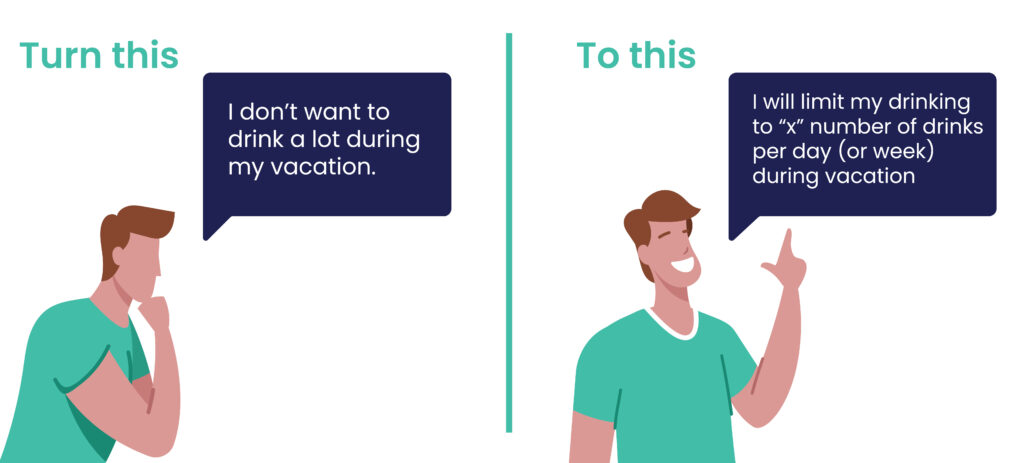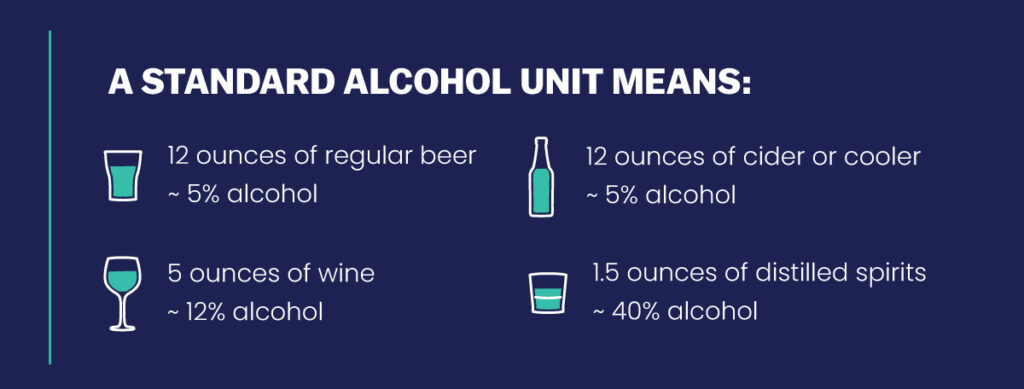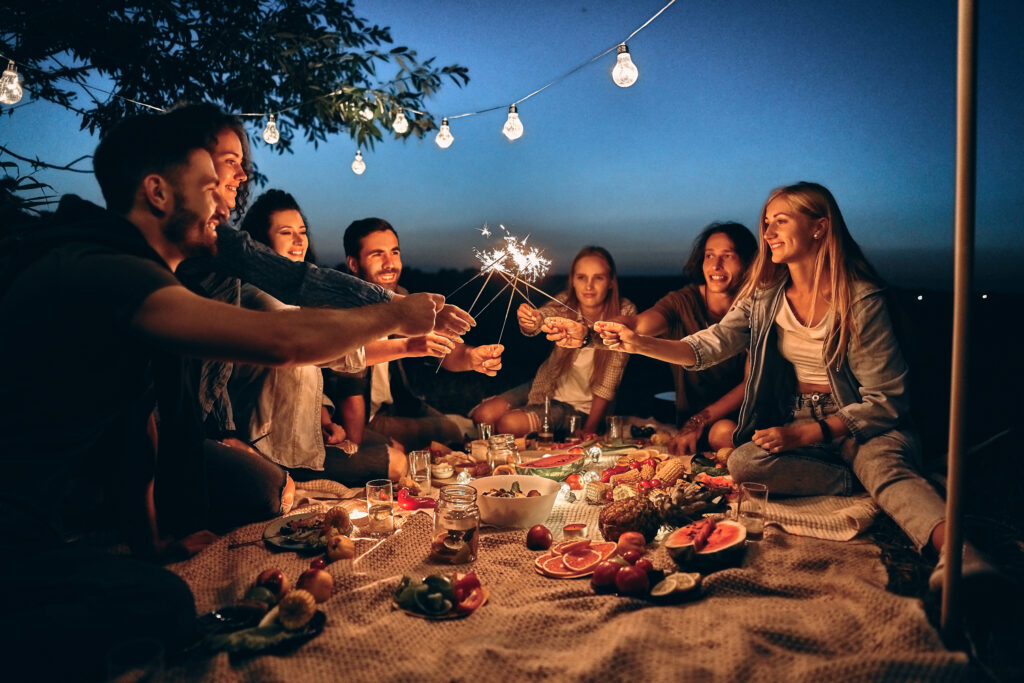The Vacationing Effect: When Substance Use Goals Get Sidetracked (And How You Can Get Back on Track)

Trying to figure out how to maintain or jumpstart your goals while on vacation this summer? Keep reading!
Summer is calling your name. The familiar cottage rush is making a mass exodus out of your neighbourhood and that long-awaited camping trip or poolside vacation you’ve been planning is almost here.
You should be able to enjoy your vacation time while staying committed to your substance use goals. If you establish clear intentions to help meet your goals in a sustainable, and realistic way, you can have a good time, minimize potential negative effects, and even avoid unwanted hangovers or other undesired consequences.
Whatever your consumption goals are for this summer, implementing the following tips is a great way to elevate your vacation experience.
Setting specific goals paves the way for success
Choose a goal that feels realistic
When it comes to getting the results you want, having vague goals or a rough idea that sounds promising doesn’t always translate into actionable behaviours. In fact, it can often lead to the opposite effect. Especially when unexpected circumstances arise, throwing more challenges into the mix. As a result, staying on track becomes difficult.
Bottom line. Vague goals can set you up for failure because they are built on a shaky foundation to begin with. Focusing your intention and purpose helps to clarify your goals and minimizes the dreadful cycle of guilt, self-judgment and sadness when those vague goals don’t materialize.
To prevent this cycle, start thinking about manageable, realistic steps or approaches to your consumption goals. For example:

This way, you have a clear and realistic target that you can track and adjust as needed.
Break it down into actionable steps
Now that your intention is set, you can take it a step further. Using a goal-setting outline like SMART goals or other goal management techniques, you can flesh out your goals and scale them to fit your needs. A SMART goal is one that is Specific, Measurable, Achievable, Relevant, and Time-Bound.
Imagine you are going on vacation and want to limit the number of drinks you have. One way to break down this goal is by outlining a plan for each day which could look like this:
- Day 1: Drink only 3-4 units of alcohol, plus 2 glasses of water in between each alcoholic beverage.
- Day 2: Take a break from drinking any alcoholic beverages.
- Day 3: Drink only 3-4 units of alcohol plus 2 glasses of water in between every alcoholic beverage.
- Day 4: Drink only 2-4 units of alcohol plus 2 glasses of water in between every alcoholic beverage.
- Day 5: Take a break from drinking any alcoholic beverages.
- Day 6: Drink only 2-4 units of alcohol plus 2 glasses of water in between every alcoholic beverage.
- Day 7: (Final Day) Drink 0-2 alcoholic beverages.
Note: Typically, a “unit” of alcohol refers to a single serving, such as a standard cocktail, beer, or glass of wine. However, it’s important to note that consuming a double or extra-large glass of wine, for example, may exceed the equivalent of one unit.

Transform mental notes into written reminders
Now that you have a clear picture of how you’d like to achieve your daily consumption goals, let’s focus on how you will remind yourself whilst splashing on your ocean excursion.
Lists, printable calendars, or goal monitoring apps are here to help and serve YOU. Utilize these tools. Just like you would use a social media blocking app to minimize screen time, you can use goal-oriented apps that work in the same way.
If you’re already on the TRAiL you’ll know that ALAViDA’s tracking tool (under “Journal”) is an easy way to help you meet your targets and stay on course.
Prepare for the unexpected with a personalized toolbox
Just as you would purchase travel insurance for any mishaps along the way, you can create a running list of potential factors that could derail your vacation consumption goals.
Here’s the deal. Understanding your emotional, mental, physical, social & environmental triggers can help minimize threats to your goals.
Putting in the effort to create a comprehensive toolbox, which includes a list of triggers and strategies to effectively manage them, is highly valuable.
Here are some examples of triggers, and tools to help you overcome them:
Triggers: Frustration while commuting, feeling stressed while travelling, feeling the urge to drink at the airport bar.
Tools: Practice mindfulness techniques while waiting in line. Bring a book to read, stream a funny show while waiting for a flight.
Triggers: Going to a party, meeting friends at a bar, feeling socially pressured to consume.
Tools: Practice social refusal skills (I’m good, thanks), drink a non-alcoholic beverage, let your friends know you are limiting your consumption.
Triggers: Feeling bored, uninspired or lonely.
Tools: Try a new activity, go out for a walk, go to a coffee shop, journal, talk to a friend, take a hike, or explore new parts of your city.

The setback trap: overcoming obstacles and embracing progress
Setbacks can and do happen. When we think our t’s have been crossed and our i’s have been dotted, some challenges may occur.
For example: you are on vacation, and you set a limit of drinks for yourself, but you are feeling stressed and end up going over your limit. There is no need to punish yourself, this is a temporary setback, and you might even learn from it.
“The biggest take-away from a setback should come from how you respond and what you do next.”
To mitigate the spiral effect of the negative–emotion-overconsumption-feeling–guilty trap, you can prepare some safeguards ahead of time to deal with setbacks:
- Manage expectations accordingly: Perfection isn’t realistic, and setting unrealistic expectations of yourself sets you up for failure. Embrace your imperfections every step of the way.
- When life gives you lemons, make lemonade: Your response to a setback is important; choose to mindfully respond instead of feeling reactive to a setback.
- Goals can shift, do your best everyday: Quoting author Miguel Ruiz in the Four Agreements, “Always do your best.” Your best yesterday may not be your best today, but accepting who you are and what you have accomplished is key.
- Remember, the path to change is not linear: The pathway to change is filled with peaks, valleys, and peculiar dips before things level out. Trust the process.
- Focus on the present: Rome was not built solely by focusing on what did not work yesterday. It was built by learning from yesterday’s mistakes and using that knowledge in the present as a tool.
- Reframe non-productive ruminations & emotions: Reframe to stop the self-blame. If you are telling yourself “I always screw-up” reframe that statement to: “I accept my mistakes and move forward by trusting my ability to grow and improve from this experience.”
- Use techniques and skills from your toolbox: Continue to grow your list of tools. Review them often and modify where needed.

Enjoy yourself, you deserve it!
Remember that staying on track with your substance use goals during vacation is not about being perfect or rigid! It’s about being flexible and compassionate with yourself and making the best choices for your wellbeing. Set clear intentions, plan for potential challenges, and be versatile and kind to yourself so you can enjoy your time off without compromising your health or happiness.
“Vacations mean a change of pace, a gentleness with ourselves, a time of rest and renewal, and a time to stretch ourselves and encounter new people, new lands, new ways, and new options.”
—Anne Wilson Schaef
ALAViDA, Substance Use, can help you build your toolbox when you want to change your relationship with substances.
If you’re looking to make changes to your substance use behaviour, ALAViDA can offer the help you need. Our iCBT modules (internet-based Cognitive Behavioural Therapy) are one of the primary support options we provide, along with coaching and resources available through the TRAiL platform. In addition to iCBT, we offer notifications and tracking tools to keep you on track, and optional group coaching to help you connect with others who are also working towards their goals. Together, these resources can help you change your relationship with alcohol and other substances and make lasting improvements to your mental health and well-being. Click here to sign up or login to the ALAViDA TRAiL.
About the author:
Jen Kunlire is a virtual health coach at ALAViDA Substance Use. She’s also a workshop leader, and writer. With over a decade of experience working in the human services sector facilitating group workshops, her dynamic approach to psycho educational topics, and group coaching has allowed her the opportunity to connect with others in an authentic and meaningful way.
Note: The language surrounding substance use is constantly evolving. At ALAViDA we focus on non-judgemental language. While we work to break down stigma, please note that some of these references may include language such as ” relapse, abuse or sobriety”.
Sources:
SMART Recovery. (2022). Smart Recovery Tool – Goal Setting. SMART Recovery.Org. https://www.smartrecovery.org/goal-setting/ Hartney, E., & Umhau, J. (2022, September 16). Stages of Change Model of Overcoming Addiction.VerywellMind. https://www.verywellmind.com/the-stages-of-change-model-of-overcoming-addiction-21961/ Osmanski, S. (2023, March 30). Put On Your Resting Beach Face—220 Vacation Quotes That Will Inspire You to Travel, #2. Parade.com/ https://parade.com/973541/stephanieosmanski/vacation-quotes/ Ruiz, Miguel. (2001, September 14). The Four Agreements; A practical guide to Personal Freedom, A Toltec Wisdom Book. Amber Allen Publishing, https://www.amberallen.com/product/books/the-four-agreements-trade-paperback/